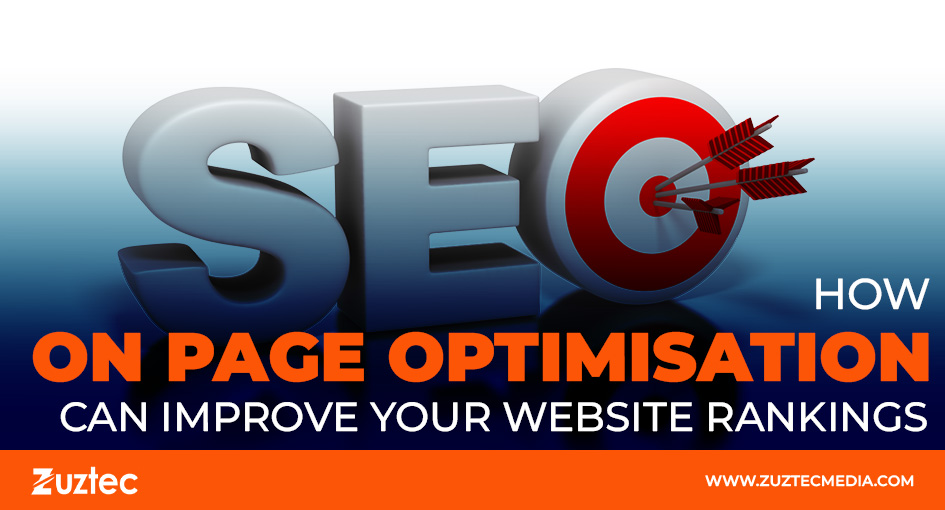
How On Page Optimisation Can Improve Your Website Rankings
In the world of digital marketing, one of the most crucial factors that determine a website’s visibility in search engine results is its search engine optimisation (SEO). With millions of websites competing for attention on the web, SEO plays a key role in ensuring your site stands out and gets the traffic it deserves. While there are many aspects of SEO, on page optimisation is one of the most fundamental and effective techniques for enhancing a website’s search engine rankings. Simply put, on page SEO refers to the adjustments made to the content and structure of a website to improve its visibility and ranking on search engine results pages (SERPs). These optimisations involve everything from content, keyword integration, and meta tags, to technical elements such as site speed and mobile-friendliness.
In today’s highly competitive online space, it’s no longer enough to just have a website. To get noticed, your site must be optimised in a way that search engines like Google can easily crawl, index, and understand its content. By focusing on on page SEO, businesses can ensure that their websites are not only user-friendly but also search engine-friendly, improving their chances of ranking higher and being found by the right audience. Effective on-page SEO helps websites drive more organic traffic, enhance user engagement, and ultimately, increase conversions.
This article will explore how on page optimisation works and how it can significantly improve your website rankings, providing you with the knowledge to implement the best practices that will help your site rise above the competition.
What is On Page Optimisation?
On page optimisation refers to all the actions taken directly within the website to improve its position in the search rankings. This includes optimizing various elements such as titles, meta descriptions, URLs, content, images, headings, and internal links. The goal of on page SEO is to make each webpage on your site as relevant, informative, and easy to understand as possible, both for users and search engine crawlers.
On- page SEO is vital because search engines like Google prioritize user experience and the relevance of the content. If a page is well-structured, easy to navigate, and provides valuable information, it is more likely to be ranked higher than poorly optimised pages. Since search engines consider over 200 factors when ranking websites, having a solid on-page optimisation strategy ensures that you are covering essential SEO elements that directly influence your site’s visibility.
How on page optimisation Impacts Your Website Rankings
Here’s how implementing proper on-page optimisation can help improve your website’s rankings:
1. Optimizing Title Tags for Relevance
The title tag is one of the most important elements for SEO, and it’s the first thing users see on search engine results pages (SERPs). By including targeted keywords in your title tags, you increase the chances of your website ranking for those keywords. However, it’s important to balance SEO with user intent, so the title should be enticing and relevant to the content on the page.
For example, if you are targeting a keyword such as “on-page optimisation for SEO,” your title tag should look like: “on-page optimisation for SEO: Improve Your Website Rankings.” This clear, concise title not only helps with ranking but also encourages users to click on the link.
2. Meta Descriptions that Drive Click-Through Rates (CTR)
Meta descriptions are short summaries of your webpage content that appear under the title tag in search engine results. Although meta descriptions are not directly used as a ranking factor, they are important for improving your click-through rate (CTR). A well-crafted meta description that includes your target keyword and entices users to click will improve your CTR, which can indirectly influence rankings.
For example: “Learn how on page optimisation can boost your website’s SEO rankings. Discover actionable tips for better search visibility.”
3. Optimizing Headings and Content for Readability
Search engines value high-quality content that is well-organized and easy to read. Proper use of headings (H1, H2, H3, etc.) helps break up the content, making it more readable for both users and search engines. Your main heading, or H1 tag, should include your target keyword and clearly describe the topic of the page.
Incorporating relevant keywords throughout the content in a natural, non-spammy way is crucial. Search engine fines may be imposed for keyword stuffing. However, when you integrate your primary keyword and related terms naturally into the content, it signals to search engines that your page is relevant for specific queries. Be sure the content answers the search intent and provides value to your visitors, as this leads to higher engagement and better rankings.
4. Internal Linking for Improved Navigation and Crawling
Internal linking enhances website crawling and structure by directing traffic to relevant pages, increasing user engagement, and enabling search engines to understand content context. For example, linking to blog posts on on-page optimization techniques helps users navigate the site and spreads link equity.
In conclusion, on-page optimisation plays a pivotal role in improving your website’s rankings and overall performance on search engines. From optimizing title tags and meta descriptions to ensuring fast load times and mobile optimization, every element of your site can impact how it ranks. By strategically implementing on-page SEO best practices, businesses can not only improve their visibility but also drive more organic traffic, enhance user experience, and ultimately achieve higher conversion rates.
Remember, on page optimisation is not a one-time task but an ongoing effort. Regular updates, content refinement, and performance tracking are essential to maintaining a competitive edge in search rankings. By staying proactive with on-page optimisation, your website can continue to climb search engine results and deliver valuable results to your business.

